Shelf Life #8
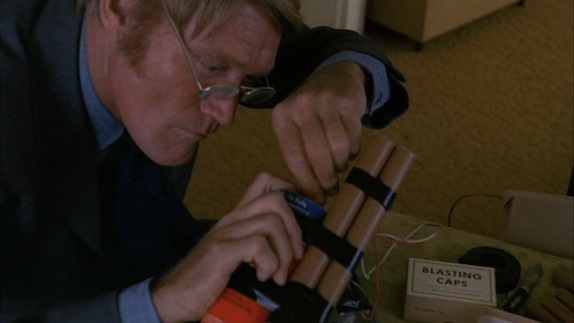
In this edition of Shelf Life, Aaron Yap’s ongoing series of back catalogue film viewing, you’ll meet a crazy bomber, grumpy cop and serial rapist in The Police Connection; a pre-Mad Men ad exec beset by existential angst in The Arrangement; and young punkers Diane Lane and Laura Dern as The Fabulous Stains in Ladies and Gentlemen, The Fabulous Stains. Table for six?
THE POLICE CONNECTION

Not sure where Bert I. Gordon’s head was in 1973, but he took a break from his usual monster movies to make this scuzzy, forgotten piece of exploitation that resembled nothing else in his filmography. It’s not just that The Police Connection (aka The Mad Bomber) is such a genre change, but also that it’s marked by an unusually misanthropic vibe. Sleazing up the screen with nasty rape scenes, not one but three unsavoury main characters, and a jaw-droppingly graphic and downbeat ending, this procedural/psycho-thriller will make you feel like having a rigorous post-viewing hose-down.
In light of recent events, the film exudes a certain disquieting quality too, being about an unhinged man named William Dorn (Chuck Connors) who’s getting back at the world for his daughter’s drug overdose by planting homemade bombs around Los Angeles. Grumpy cop Geronimo (Vince Edwards) is tasked with finding Dorn, but his one and only lead is Fromley, a serial rapist (Neville Brand) who might have caught a glimpse of Dorn during an attack on a mute girl in a hospital.
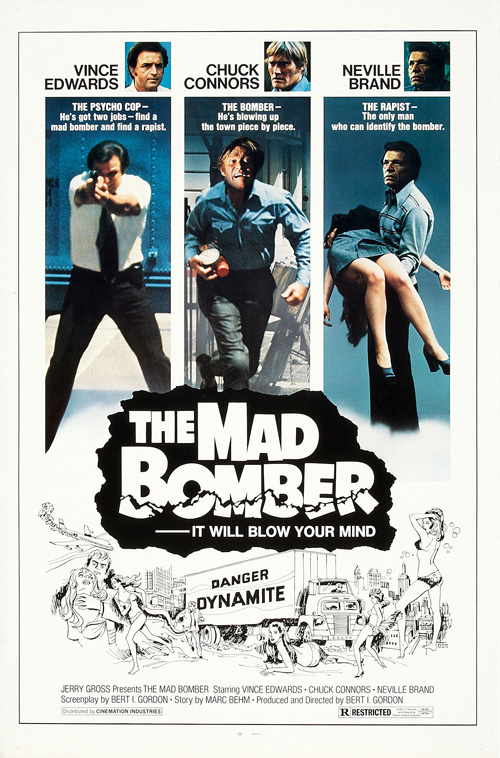
So yeah, it is a bit of a tough ask to hang out with these three individuals for an hour-and-a-half; actually the more I think of it, Dorn comes off best, mainly because of Connors’ terrific, magnetic performance — easily a career best. A former pro basketball and baseball player who came to prominence on the classic western TV series The Rifleman, Connors, with his thin glasses, tall, threatening frame, and intensely square jaw, does look suitably mad, and he does a convincing job of ranting against social ills, while becoming increasingly haunted by memories of his daughter. Edwards (from TV’s Ben Casey) plays Geronimo with such a scary, piggish lack of compassion that borders on psychotic; his bright plan to nab Fromley is to “blanket the city with policewomen asking to get raped”. Go-to villain Brand (D.O.A.) is thoroughly repugnant as Fromley, a character whose wormy presence reaches its skin-crawling nadir in a scene where he masturbates furiously to 8mm loops of his naked wife — something which she seems perfectly okay with.
Code Red’s DVD presents the film uncut for the first time and it looks pretty good all things considered. Unfortunately no extras though; it would have nice to get a little background on its production (was Marc Behm’s story inspired by real-life mad bomber George Metesky?). ’70s exploitation fans will want to snap this up pronto.
THE ARRANGEMENT
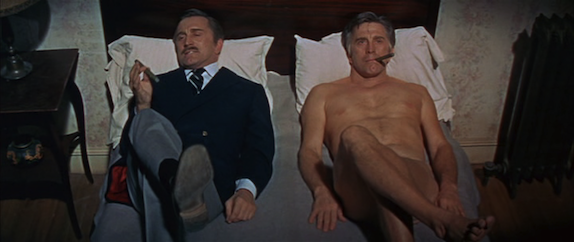
In the ‘50s and ‘60s Elia Kazan enjoyed success in Hollywood as one of their most revered directors, having made such classics as A Streetcar Named Desire, On the Waterfront and East of Eden. At the same time he was a hugely controversial figure: in 1952, he dobbed in some of his fellow colleagues – and Communist Party members – before the House Committee on Un-American Activities, a move that would taint his entire career.
The final nail in his proverbial coffin was probably The Arrangement (1969), a critically savaged adaptation of his semi-autobiographical bestseller. But time has been fairly kind to this film, its devastating, exhausting, unwaveringly personal portrait of an ad exec (Kirk Douglas) suffering an existential crisis in many ways prefiguring current TV fave Mad Men.
The film joins Frank Perry’s The Swimmer as the era’s superlative unravelling of cushy American suburban dream: it’s soulful, haunted, emotionally tethered to the psyche of a protagonist who has to break himself down to escape the superficial, false contentment of his life. Douglas, in a role initially intended for Marlon Brando, gives a versatile, powerfully anguished performance, and he’s joined by a dynamite cast that includes Deborah Kerr as his bitter, long-suffering wife and Faye Dunaway as his alluring mistress.
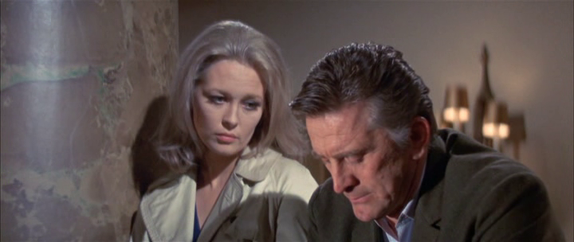
The Arrangement is probably Kazan’s LOUDEST film, slathering a myriad of New Wave/pop-arty stylistic tricks (flashbacks, dream sequences, voice-over, comic exclamations) on top of its blaring melodrama in an effort to mirror Anderson’s loopy, chaotic mindset. Think Michelangelo Antonioni’s chilly studies of the disenchanted affluent given a booster shot of Nicolas Roeg’s psyched-out editing: it’s a mess, but it’s a fascinating mess that’s too compelling to forget.
LADIES AND GENTLEMEN, THE FABULOUS STAINS
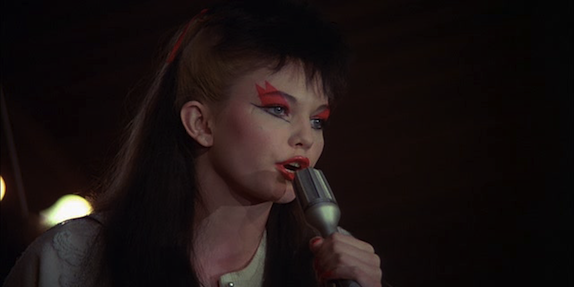
I can’t think of many record producers who’ve dabbled in feature filmmaking, but Lou Adler, who recorded the likes of Sam Cooke and Carole King, was one. During the ‘70s Adler ventured into cinema, producing the cult classic The Rocky Horror Picture Show and directing the Cheech and Chong stoner romp Up in Smoke. The only other film he ever directed was Ladies and Gentlemen, the Fabulous Stains (1981), a grungy little punk movie that was barely released and shelved by the studio but has since gone on to gain a loyal following, among them Toby Vail from Bikini Kill and Courtney Love.
Written by Slap Shot’s Nancy Dowd, who later disowned the film after the studio re-shot the ending, the story charts the brief rise-and-fall of a teenage garage band (Diane Lane, Laura Dern, Marin Kanter) who accidentally end up an overnight hit whilst on tour with ageing heavy metal rockers the Metal Corpses and Brit punkers the Looters (led by Ray Winstone, who looks like he just crawled out of his mother’s womb).
It’s essentially a satire on both the media and audience’s influence on shaping and nurturing flavours-of-the-month regardless of talent: the Stains are amateurish at best, sloppy performers with off-key singing, but their rebellious, provocative dress sense, “skunk” hairdos, and angsty catchcry of “Don’t put out” make for perfect sensationalist news fodder. In this age of pre-fab pop stars and fame-seeking reality TV idols, Adler’s film clearly still strikes a sharp chord, even if its tone veers towards needlessly broad spoofing on occasion.
Regardless, it’s held together by Lane’s raw performance as Corinne “Third Degree” Burns, the Stains’ leader — it’s a gutsy role full of stroppy vigor that’ll resonate with anyone who’s ever been a misunderstood teenager aching for their voice to be heard. Look out for The Clash’s Paul Simonon and ex-Pistols Steve Jones and Paul Cook in Winstone’s band.


















